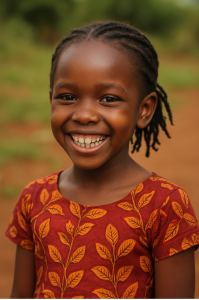 When Amina was 8, she had never known what it meant to eat dinner with a family. She grew up in a large children’s home outside Nairobi, with dozens of other children cared for by a rotating staff. She was safe but not seen.
When Amina was 8, she had never known what it meant to eat dinner with a family. She grew up in a large children’s home outside Nairobi, with dozens of other children cared for by a rotating staff. She was safe but not seen.
Last year, thanks to Kenya’s new care reform programme, social workers traced her aunt in Kisumu. With counselling and small financial support, her aunt welcomed Amina home. Today, she walks to school with cousins, helps fetch water in the evenings, and has someone to tuck her in at night.
Amina’s smile says it all: she belongs.
Amina’s journey is part of a much bigger story. Kenya is changing how it cares for children. The aim is simple but profound: no child should grow up in an institution if a safe, loving family is possible.
Kenya is in the middle of a major child welfare transformation. For decades, children’s homes (“orphanages”) were the default safety net. Today, the law and the strategy are clear: the future is family-based care.
“The best place for a child to grow is in a safe and loving family. Institutions are a last resort.” — National Council for Children’s Services (NCCS).
This transformation is underpinned by two key policies/strategies:
- Children Act, 2022: Enshrines the best interests of the child and makes family-based care the priority.
- National Care Reform Strategy (2022–2032): A ten-year roadmap to transition thousands of children from institutions into families and communities.
This is not just an aspiration – real change has already happened:
✅ Foster care is growing – Over 1,600 foster parents are already registered.
✅ Families are being supported: financial support, disability services, and the new Positive Parenting Guidelines help prevent separation before it happens.
✅ Helpline 116 – Toll-free, 24/7, linking children and families to county protection services.
✅ Institutions are shifting: many homes are now planning to re-purpose as short-stay rescue centres or family support hubs.
✅ Child Protection Information Management System (CPIMS) – A digital case management system, now used across Kenya.
And more is in the pipeline:
- Now–2026: Licensing, compliance checks, and stronger support to prevent family breakdown.
- 2027: Target year to have 70% of children from institutions placed with families.
- 2028: All institutions must submit approved transition plans.
- 2032: Reform complete — institutions operate only as short-term, therapeutic facilities; the norm is family care.
KCC delivers all of its services in Kenya through a Charitable Children’s Institution (CCI) called Kujali. Kujali has been transitioning its services from its roots as an orphanage to align with the Kenyan Government’s strategy of prevention, alternative care and reintegration.
We run three types of outreach programmes:
- Feeding programmes in slum schools, to encourage attendance and give children the energy to learn
- Counselling services to provide generic support to the children in school, and specific support to families
- Education support, to enable the most disadvantaged children to attend school
In addition, at our centre near Thika, we have four further programmes:
- A baby unit to care and nurture for abandoned babies
- Short-term residential care, for displaced children and
- A unit to support teenage mothers and their babies, and give them the skills that they need for the future.
- These three are all underpinned by our reintegration service, which tries to reconnect the babies and children in our care with their families and communities. Where this is not possible, we seek to have them adopted by a loving family or placed in foster care.
National Council for Children’s Services strategy for children
These reforms are ambitious and evidence-based. Transitioning care safely requires:
- Training for social workers and caregivers.
- Financial support for vulnerable families.
- Specialist services for children with disabilities.
- Monitoring and accountability systems.
But transforming children’s services isn’t free. It takes trained social workers, community support, and funds to strengthen struggling families. Unfortunately, these reforms are also underfunded, which is why the Kenyan Government is partnering with organisations like Kujali, funded by Kenya Children Centres in the UK.
Your donation helps ensure:
- Vulnerable families don’t break apart for lack of food, school fees, or medical care.
- Children who ‘drop out’ of the system are supported and nurtured by our trained and caring staff
- Children are reunited safely with their families and communities, or found loving adoptive parents
Your support will help Kenyan children grow up in safe families, not institutions. Your donations support our family-strengthening programmes. Your advocacy can spread the word that children belong in families.
Because children need families, not facilities. Because every child deserves to say “I belong”.